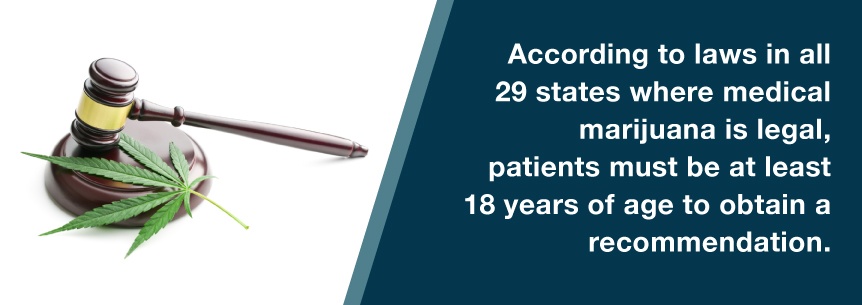
As a doctor in the 21st century, you may be asking yourself, “Is medical marijuana right for my patients?” With the recent legalization of medical marijuana in most U.S. states, many doctors are weighing the pros and cons of medical marijuana treatment for their patients. However, doctors must consider both legal and non-legal factors in the process to protect themselves and provide the best patient care possible.
Determining whether or not medical marijuana is right for your patients requires careful consideration. Although you cannot prescribe marijuana medication as a cannabis-certified physician, you can recommend certification for patients who have qualifying conditions. The laws vary by state regarding qualifying conditions, so the best starting point is to know your state laws inside out.
Many of the choices you make as a medical marijuana doctor will depend on your relationship with your patient and your knowledge of their medical history. If a patient is not a good candidate for medical marijuana, many times, the warning signs are clear. However, sometimes you’ll need to dig deeper to make sure it’s the right choice.
In this post, we will help guide you by exploring the most important factors to consider when deciding to recommend a patient. Joining the medical marijuana community as a doctor is an exciting and rewarding step from both a business and patient-care standpoint.
Recommending medical marijuana will likely take a few visits with your patient to make sure it’s the right treatment for them. Throughout the process, you will have time to discover your patient’s needs and learn about their medical past. In general, the steps for recommendation follow this path:

We’ll look at the steps in more detail below to help you decide if a patient is a good candidate. In some cases, medical marijuana can help patients manage symptoms of complex disorders when conventional treatments have failed.
Under federal law, marijuana is still considered a Schedule I drug, which means it has a high potential for abuse or addiction — according to lawmakers. Federal law prohibits distributing, dispensing or possessing marijuana. Some politicians are working to remove marijuana from the controlled substances list, but in the meantime, it is still illegal on a federal level. Physicians need to keep in mind the seriousness of marijuana laws.
With that said, it’s vital to examine the patient and determine a qualifying condition before recommending marijuana treatment. The standards and laws regarding qualifying conditions vary in each state, but overall, you will use your judgment as a medical professional to determine if the benefit of marijuana outweighs the risk for your patient. Many states with medical cannabis laws consider the following conditions to be treatable with marijuana:
Depending on where you live, you may or may not recommend marijuana for the following conditions:
Marijuana treats many other disorders that may not be on the list of qualifying conditions in your state. Your first step in determining if medical marijuana is right for your patient is identifying and verifying a qualifying condition that’s both legal and treatable with marijuana.
Every state has an age requirement for patients who wish to obtain medical marijuana. According to laws in all 29 states where medical marijuana is legal, patients must be at least 18 years of age to obtain a recommendation. However, you may have underage patients suffering from a severe condition, like cancer. Many state laws recognize the need to treat minors with the consent of a caretaker. States that currently allow parents or caretakers who are at least 18 to obtain medical marijuana for a qualified minor include:

The following states require caretakers to be at least 21 years old to obtain medical marijuana for a minor:
The brain is still developing at least until the early 20s, and possibly up into the mid-20s. According to the American Psychological Association (APA), some researchers are concerned that marijuana disrupts brain development in younger patients, and studies have produced conflicting results. More research is needed to establish a safe dose amount for young patients. Despite the benefits of marijuana as a medicine, it should only be used for minors if nothing else works to treat a severe condition.
Sometimes, marijuana is an effective treatment where other treatments have failed, produced undesirable side effects or led to addiction. For example, medical marijuana may be used to treat the following conditions better than conventional methods:

Some patients want medical marijuana to avoid side effects from certain medications, while others fear developing dependency on conventional painkillers. For some conditions, like the ones above, marijuana treatment works better than traditional medications.
When evaluating your patient, discuss what they’ve tried and why it hasn’t worked. Consider what marijuana can offer that traditional treatment could not, and make sure they understand the side effects of marijuana treatment such as impaired driving and the potential for psychological dependence.
Also, check their records. Is it documented that the patient has tried other treatments, and they have failed? If not, you might consider trying conventional treatments first to make sure marijuana is the right choice.
The biggest question you’ll need to answer when deciding if medical marijuana is right for your patient is if the benefits of medical marijuana outweigh the risks. Consider how the following health benefits of cannabis can help your patient:
Although marijuana has been shown to treat a range of conditions and symptoms, each person reacts differently to cannabis. Dose and strain also contribute to the effectiveness of the medication.
For example, if a patient suffers from panic attacks, you may not want to recommend marijuana medication. However, for some patients, marijuana eases their anxiety — a lot depends on the patient and the type and amount of medical marijuana consumed. Consider the potential side effects of marijuana and compare them to conventional medications to help you decide:
Those who should not take marijuana include:
The Federation of State Medical Boards (FSMB) suggests establishing a physician-patient relationship before recommending medical marijuana treatment. The best patient care results from a team effort and shared responsibilities between doctor and patient.
Ask yourself how long you’ve known the patient and consider whether or not you’ve built and documented a relationship with them. Only after you know the patient and their medical history will you feel confident in recommending marijuana. This does not mean medical marijuana shouldn’t be a treatment option for new patients, but just keep in mind the value of a patient relationship.

A patient with a substance abuse disorder or a co-occuring disorder may need special treatment. Refer them to a mental health counselor or psychiatrist if needed and carefully weigh the risks and benefits of medical marijuana.
It’s been shown that medical marijuana helps some individuals recover from opioid addictions. Marijuana may also be an effective treatment for amphetamine addiction and alcoholism. However, marijuana medication can be wrong for some patients with a history of marijuana abuse or other substance abuse. They might use more than the recommended dose of marijuana medication or take it when it is not necessary. Some patients may develop a psychological dependence on marijuana as well, causing more harm than good.
It may be easier to decide with patients you’ve known for some time, so be extra cautious with new patients. Evaluate their current condition and verify their history. Check the Prescription Drug Monitoring Program (PDMP) in your state before making a recommendation for any patient.
If you and your patient have concluded that marijuana would treat their condition better than other treatment options and would not pose serious risks to their health or well-being, you are almost in the position to recommend cannabis. There are a few more factors to consider when deciding whether or not they qualify. These include:
Always remind patients not to operate heavy machinery or drive while under the influence of marijuana.
Many patients want to treat their condition with medical marijuana and believe marijuana is safer than conventional painkillers. In fact, a recent Quinnipiac University poll found that 93 percent of Americans support the use of medical marijuana. Even though the majority of Americans have faith in marijuana as a healing plant, doctors are ultimately responsible for deciding whether or not medical marijuana is the best treatment option for their patients.
If you are a marijuana-certified doctor, you likely believe in the positive results marijuana yields for patients with complex disorders. Thousands of patients with various conditions are seeking assistance from doctors like you.
Join our extensive network today to easily reach patients in need of medical marijuana treatment. As a MarijuanaDoctors.com member, you’ll enjoy greater exposure, convenient pre-qualified patient appointment requests and more. To stay informed about the latest medical marijuana research, sign up for our free monthly newsletter.
No Information on MarijuanaDoctors.Com should be used to diagnose, treat, prevent or cure any disease or condition. You can view our Full Disclaimer here.